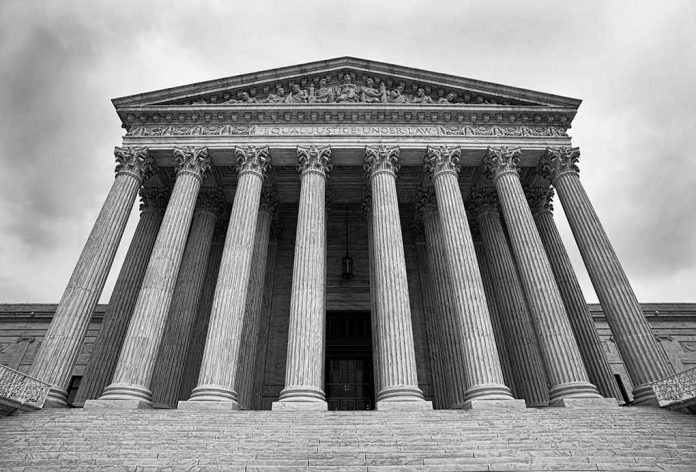
(UnitedVoice.com) – Texas Republican Governor Greg Abbott (R) signed the state’s controversial new immigration measure into law on December 18, 2023. SB-4 amends the state’s penal code to make it a Class B misdemeanor for an alien to enter or attempt to gain entry into Texas from another country using any location other than a “lawful port of entry.”
Likewise, the measure enhances the penalty for a second or subsequent conviction to a state felony level. Additionally, the new law enables Texas judges to require individuals who entered the state illegally to return to the “foreign nation from which they crossed.”
The Biden Administration, ACLU, and immigrant advocacy groups filed a federal lawsuit and obtained a temporary injunction blocking enforcement of SB-4 before the new law went into effect.
The case bounced around between the lower courts before finally reaching the US Supreme Court.
SCOTUS Rules on Controversial Texas Immigration Law
On March 19, SCOTUS issued a ruling lifting a previously granted stay by Justice Samuel Alito, blocking SB-4. Texas officials had appealed the district court’s temporary injunction, and the 5th US Circuit Court of Appeals issued an administrative stay blocking that order, allowing the Texas immigrant to take effect.
Abbott issued a statement praising the ruling, calling it a “clearly positive development.” Texas Attorney General Ken Paxton (R) echoed that sentiment and called it a “huge win” for Texans and a bitter defeat for Biden administration officials and the other plaintiffs who had filed an emergency petition with SCOTUS.
Justice Amy Coney Barrett, joined by Alito, wrote the majority opinion for the court. The panel held that since the 5th Circuit only issued a temporary administrative stay pending the outcome of oral arguments scheduled in early April.
Barrett wrote that it wouldn’t be proper for SCOTUS to pre-empt the 5th Circuit since it hadn’t issued a formal ruling yet on the legal questions raised. However, her opinion strongly encouraged the appeals court to speed things up. She also indicated that the nation’s highest court expected to get the case again once the 5th Circuit ruled.
But Wait…
Later that day, a three-judge panel from the 5th Circuit court weighed in and lifted its previously granted administrative stay, blocking the enforcement of SB-4 again. The panel also scheduled oral arguments via a video feed for the following morning.
Court watchers reported that the hearing ended up being a confusing mess. For instance, at one point, Texas Solicitor General Aaron Nielson asked the panel not to block SB-4 in its entirety. He suggested that allowing state law enforcement officials to arrest illegal migrants and turn them over to federal officials wouldn’t violate current immigration statutes.
However, one of the panel’s judges pointed out that Texas law didn’t direct state officials to turn migrants over to the feds.
It remains unclear when the 5th Circuit might rule on the issue, but one thing remains clear from the case record. Whoever loses will appeal to the Supreme Court.
Copyright 2024, UnitedVoice.com






















